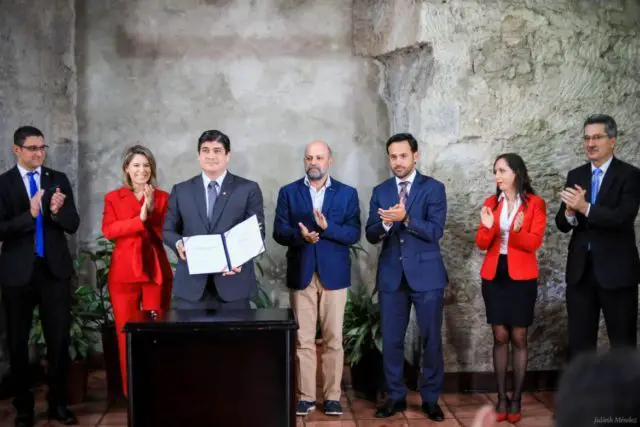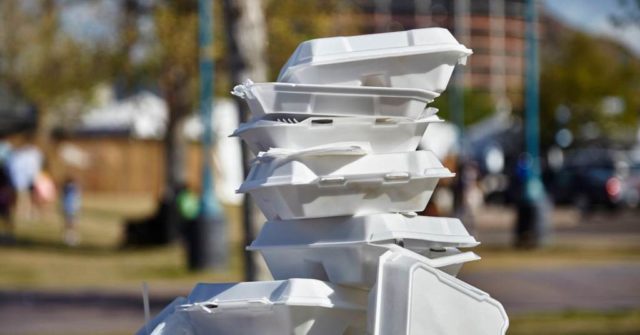The President of the Republic, Carlos Alvarado; Ministers of Environment and Energy, Carlos Manuel Rodríguez and of Health, Daniel Salas, signed on Monday morning the execution of a modification to the law for “The Integral Management of Waste” in an activity that took place in the National Center of Culture (CENAC).

Law N° 9703 decrees the prohibition of import into the national territory, the commercialization and delivery of containers or containers of expanded polyethylene, better known as styrofoam, in any commercial establishment.
Exceptions to the prohibition are those cases in which, for reasons of conservation or protection of the products, the use of alternative materials, the packaging of domestic appliances and related goods and industrial uses is not environmentally viable.
The prohibition will take effect 24 months after the Law comes into force. During this period, the State will promote and encourage the productive reconversion of the industries dedicated to the import and manufacture of containers, containers or packaging made with expanded polystyrene (material of foamed plastic that is used to produce packages), promoting the development of more environmentally friendly production alternatives, through the Banking System for Development and state commercial banking.
Within 6 months after the publication of the reform, the Ministry of Health must include in the National Policy and the National Comprehensive Waste Management Plan, a national plan to encourage the gradual replacement of containers, or polystyrene packages expanded by others of different materials.
The said plan should include an awareness component in industries, businesses and the population in general, about the need to make this change, as well as establish incentives and inform and educate consumers about the impact of products made from expanded polystyrene on the environment and the different alternatives available.
The modification arises from the styrofoam ban initiative, under file 19,833 was presented by the previous section of the Frente Amplio, and retaken by the deputy Paola Vega, and president of the Environment Commission. The law was approved in the second debate on June 13th, 2019. In the activity were also present, deputies and representatives of the Diplomatic Corps, among others.
President Carlos Alvarado indicated that it is necessary to make a change “in our minds but also in our narrative. Today we are demonstrating to Costa Rica that we are going to fight to protect their fundamental rights such as the right to health and at the same time we are sending a clear message that these actions respond to the unequivocal commitment that this administration has to reach the decarbonization of the economy”.
The styrofoam is a material commonly used in the packaging of the food industry for its lightness, hygiene, and low cost. It is resistant to heat and humidity, does not absorb water or rot; therefore, it cannot be degraded in the environment.

Coinciding with the president, the Minister of Environment and Energy, Carlos Manuel Rodríguez, said that this ban is one more step to fulfill the commitments both with the Sustainable Development Goals, the National Decarbonization Plan, and the Plastic Substitution strategy of single use. “The new narrative at an international level guides us towards more sustainable patterns of consumption and production, which allow us to protect and conserve our natural capital and create benefits for all people”.
For its part, the Deputy Minister of Water and Mares, Haydée Rodríguez, said that expanded polystyrene is one of the major pollutants of rivers and seas remaining years in the ecosystem, which cause damage to wildlife, turtles, fish, and other animals which confuse it with food. “Only with clean and healthy rivers and oceans will we be able to face the climate crisis and guarantee the quality of life of coastal communities”.
Finally, the Minister of Health, Daniel Salas, indicated that in Costa Rica there are very few alternatives for the management of expanded polystyrene, so that the majority of this type of waste ends up in landfills, or in the worst case, in the environment. “It is a material that cannot be reused. That is why the ban on the importation and commercialization of styrofoams is so important, which will lead to a reduction in the pollution caused by this type of waste“.
The biggest concern regarding environmental health associated with polystyrene is styrene, its basic component. Those who are exposed to styrene during its manufacture tend to have skin irritation, eyes, upper respiratory tract, and gastrointestinal effects. Also, when they come into contact with food and drinks, they can cause damage to human health.
